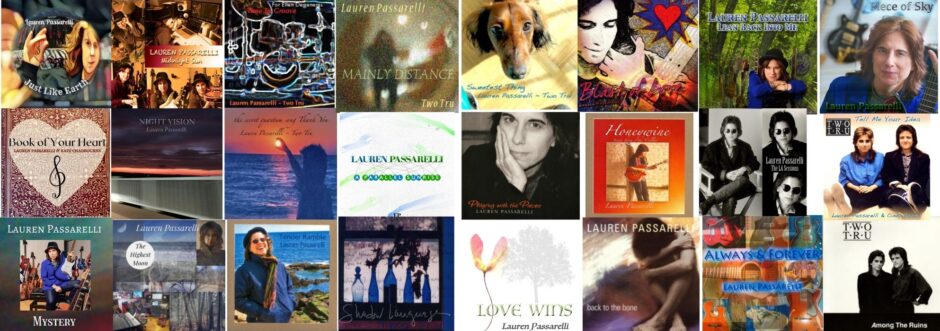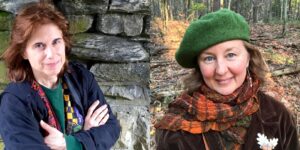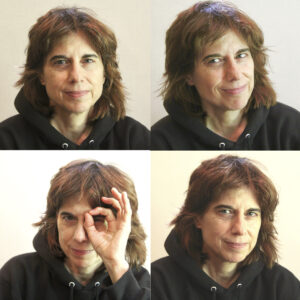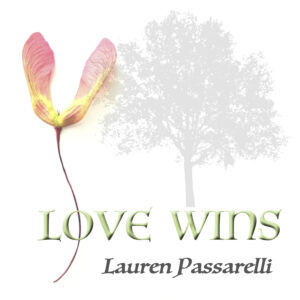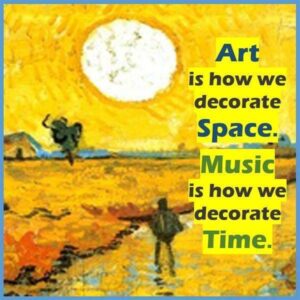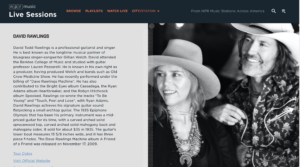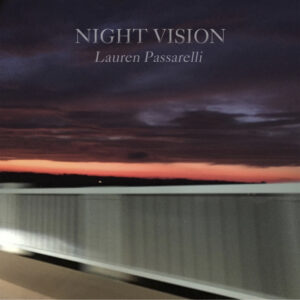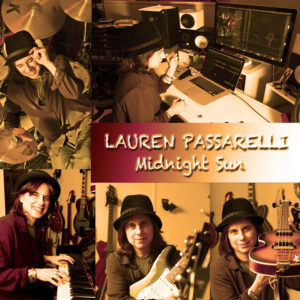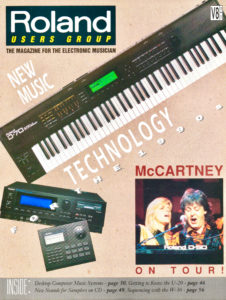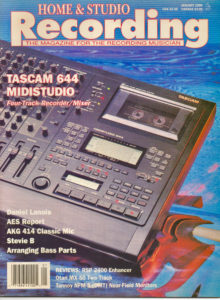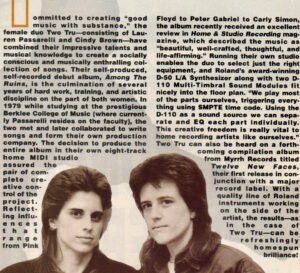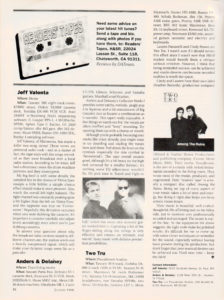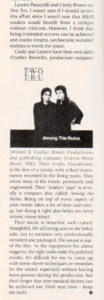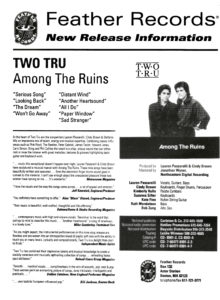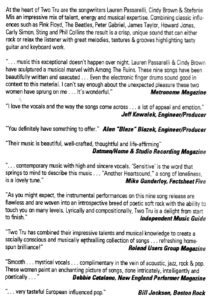Night Vision ~ Questions submitted by Robin Stone, Claudio Raino, Max Abraham, Daniel Jackson, Bernadette Mac, Stan Pulnik, and Gina M. Vanderloop.
RS: This song to my ears has a decidedly Steely Dan vibe about it. The harmonies and horn arrangements were reflective of that sound. The guitar work is intricate and rich, the slide solo reminiscent of George Harrison’s work. The majority of your tunes feature multi layered vocals so why did you decide to feature an instrumental as the first tune on the album?
LP: I love Steely Dan.
I was playing my acoustic and came up with the opening riff. It was very singer songwriter and in my usual 92 bpm – 102 bpm range and I thought what if I sped this up? I cued up a logic drummer, sped up the tempo, and offset where I played the riff so that the drum fills sounded in a cool place, and continued writing the song. I like intriguing my ear, and looking for ways to spice things up for myself.
I love the sound George Harrison got on slide, very clean and melodic. I started playing slide in 1969 so it’s a huge part of what I love in getting sounds on a guitar.
A friend came up with the title, Night Vision, and I thought it was a cool title for an album as well. Plus, it’s so upbeat and different for me it felt exciting to open with it. Bam, a strong opener.
I had asked Doug Alexander to add some clavinet and he came back with horns and clavinet parts that I loved right away. Michael Bean played the great drums replicating the crazy fills, and Mike Bishop grooved the bass.
As It Often Does
RS: The lyrics were really good and told a story. Care to discuss the inspiration for the lyrics to, As It Often Does?
LP: As it Often Does was a few unfinished song bits I had hanging ‘round for years. I loved that The Beatles would just throw a batch of those unfinished bits together to finish a song. James Taylor does that too. Happiness is A Warm Gun, is one of those and it is also a song that doesn’t fit the AABA type of song form. It’s more of an ABCD song. I thought that was great fun and wanted to write a song that never repeated a section, just kept going. I revisited these song bits I had and worked them to fit together. I had to write new bits to connect them and find a way to make the last part make sense lyrically because it really sounded like a different song. I also liked how Happiness is A Warm Gun, ends in ¾ so I ended this ABCD song in ¾.
I have a lyric book where I ramble with free association word play and object writing. Most of the time it’s boring, what seems to be useless, sometimes bad rhyming nonsense. It’s the compost pile where the freedom to write “the worst s___ in America” goes. (the author, Natalie Goldberg says this in her book, Writing Down The Bones) When I come up with a guitar idea and start needing lyrics I flip through this word play book and sing whatever I see.
Even when we ramble, playing with words, we can create meaning. We may not always be conscious of the meaning, but it comes through the words and lives in the sentences, sometimes in the music between the sentences. I love this about songwriting. So little bits of stories and emotions all sewn together can have a very big impact because each bit comes from a sincere place. Each emotion comes from a real feeling or bit of life story. Even if the bits were about several stories or different people the one song holds all those bits of meaning and becomes a whole. That’s how, As It Often Does, came about. In fact, the first line came from a book I randomly opened and wrote down. I don’t even remember the book. ” I live on the land that slants and leans towards the sea”.
That Explains The Sky
RS: A brooding tune with pretty harmony’s and lyrics, the arrangement was interesting with instruments weaving in and out of the mix. How do you go about adding layers and then deciding each instruments priority in the final mix?
LP: That Explains The Sky is one of my favorites because a friend suggested I play with 5ths on the piano to see if I could find chords I liked. I loved the idea and did find chords, and decided on some progressions. Then without me even noticing I said the phrase – that explains the sky – talking about my porch renovation that wasn’t fully trimmed and caulked yet. I often have my creativity antennae out and notice when I or someone says something cool or funny, or I hear a cool groove or chord voicing that I can start a song with. But because I was in porch talk mode, I didn’t even hear how cool the phrase, “that explains the sky” sounded until it was pointed out to me. I sang all kinds of melodies around the title and found one I liked that reminded me of Stevie Wonder and I hoped it would fit one of my 5ths progressions.
That’s the cool thing about setting our minds on a task like desiring to finish a song. Once the intention is set the mind goes to work solving the puzzle and ideas come. My melody fit my favorite progression of those 5ths ideas and became the chorus.
I had just watched the movie, THE INTERN, with Robert Di Niro. The 2nd verse was inspired by his willingness to explore and move into a whole new life chapter for himself. “Look here look there, magic in the air, new reasons to care hope everywhere. Real and now or future somehow, by design, recreate never too late.“
I love arranging layers of instruments and as I played everything on that song it just took shape and I could hear what I’d want to emphasize and feature as the mix progressed. I love all kinds of instruments and sounds and no matter what I play or trigger with a midi guitar the layer needs to fulfill a function. I ask myself does the song need rhythm, harmony, counterpoint, glue? What else needs to be here? To me the song knows what it needs and I love to listen and ask and find what that might be. Our palette of choices and colors is created our whole lives. For each song I just put in what I like.
Blue Mojo
RS: The octave playing added a nice dimension to the tune that evoked a smokey club in L.A. somewhere. The arrangement was well constructed and developed. Did you compose the chord progression first or the melody/lyrics and how do you typically write your tunes in that regard?
LP: Blue Mojo started with the melody. I was enjoying playing octaves on my D’Angelico EXSS. I was calling the little melody idea, “like Larry Carlton” until I had the title, Blue Mojo. I put about 15 different guitars in that arrangement.
Each song comes in different ways. I consciously look for new ways to write all the time. I like having many ways into finding ideas. I don’t buy into writer’s block. Creativity is something that’s always available to all of us and I like to reach for it and call on it for everything. When we expect it and relax, we find it’s been there for us all along. It’s like oxygen. It literally is the life force, magic, the thing that makes life so cool.
Sometimes a song starts because of one chord voicing I find inspiring: Blast of Love, Haven’t A Care. Sometimes it starts with a title: That Explains The Sky, Why Don’t You Pretend That You’re Somebody Pleasant. Sometimes a phrase, a progression, because I changed the tuning of one string, or tuned to an alternate tuning, or used an effects pedal. I use all these ideas in my songwriting classes to get my students to find new ways into that creative headspace by noticing something they like and developing it.
Guest List
RS: Guest List has a really nice background vocal arrangement. Mike Bishop who plays bass on some of the tracks arranged those parts. Do you feel it’s important when recording to at times give up control and let other members in the band contribute in a significant way such as he did here?
LP: Guest List was written in my twenties. My demo from back then didn’t have any back ground vocal ideas. Mike Bishop is such a great bass player and singer. He has a sweet R&B back ground. I asked him to play bass and he came back with vocal ideas too. So, it was a bonus for me because the song didn’t have any back ground vocals.
I have often wanted to be a part of something, be in a band, a cool production, be on a tour, be on an album project. I have done all these things many times and I am always wanting more of these opportunities. I realized that by writing so much material as I do, that I was the ring leader. I was the one with a lot of ideas that could invite the friends to be part of MY projects. So, I keep writing to musicians I admire on youtube, and friends I have performed with and ask and invite and share tracks and see if they want to participate. I don’t feel like I am giving up control because when I have an idea for a part, I usually play it and record it. If I am farming it out it’s because I want to include the better drummer or bass player or keyboard player for the style of my song, or I don’t feel like coming up with the part myself, and being such a vata personality it feels great to have a lot of songs simmering at once. Friends are working on parts and I am working on other aspects of the song or different songs and it feels good to have lots of things happening.
Tender
RS: A nicely arranged ballad, do you find it easier to play upbeat songs or ballads and why?
LP: Mick Goodrick told me he was an adagio person and asked if I was an adagio person. I checked my metronome and found out many songs I write are actually a bit faster than adagio, I’m an andante person. Ideas seem to generate in the andante realm for me so I purposely speed up ideas to mix things up and have more variety. I like both upbeat and ballads.
Tender was a miraculous save by my friend, Kate Chadbourne. I had written music to a famous poem and by the time the song was recorded and on it’s way to iTunes and Spotify the publisher of this famous writer had finally gotten back to me with the message, UNDER NO CIRCUMSTANCE CAN YOU USE THIS POEM AS A LYRIC. This was crushing for a moment because I looooved the music that this poem inspired from me. The song even featured, Eugene (freaking) Friesen on cello! I can’t just pull this song. So, after moping about it for a day the idea came: well, write new lyrics, ask Kate she’s a marvelous poet, musician, songwriter, author. She’ll know how to fix this dilemma. She wrote the lyrics, and changed the title to Tender, and everyone on the album who knew about this problem were thrilled and amazed by what Kate came up with. It drew out even more emotion from the music and was a much better song in the long run. So, hooray!
Used To Love
RS: You use what sound like “real” hand claps quite a bit on this tune and others on the album which is a bit of a return to the way things used to be done in the studio. How much of the analog recording style do you care to bring into the digital age when recording?
LP: I like creating sounds from objects around the house and definitely real hand claps. I usually over dub 3-6 or more of myself but on Used to Love all the back ground singers: Mike Bishop, Mary Douyard, Leah Bluestein, & Kate Chadbourne clapped with me.
I am midrange and hi end adverse so even albums I engineered and mixed on ADATS which was digital tape sounded like analog recordings. I tend to tame those frequencies to my taste. I’m also still a fan of real musicians, real instruments, microphones and contrast between digital, midi triggered sounds, and acoustic, and electric instruments.
If I Could
RS: This tune has an Elton John style character to it. The chord progression and way in which you mixed the piano up in the mix echo his music. You play most all of the instruments on many of the tunes for the album including this one. How long has it taken you to become confident enough to play them all when recording?
LP: Wow, well I love Elton so that’s an interesting, and lovely compliment. It’s a very easy piano part. I have been loving getting lost in the massive sound waves of piano and feeling the music all around me as I play. It’s a whole different experience than playing guitar. Because the piano is the main thing it was mixed up front.
I have always loved recording so it’s easy to play every instrument I can coax music from. I haven’t always been as good at these different instruments but I have often recorded myself anyway.
Hearing all kinds of arrangements in my head when I was kid made me wish for a “Dream Machine” – a multi-track recorder so that other people could hear what I was hearing. I was bouncing between two cassette decks when I was in junior HS. I got a Teac 2340, 4 track reel to reel tape recorder when I was 17. After that I was recording to a Tascam 38, half inch 8 track. Then ADATS, then the DAW, Logic.
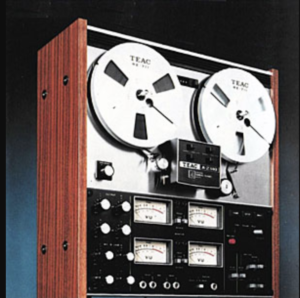
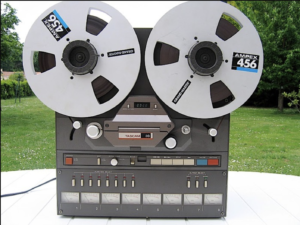
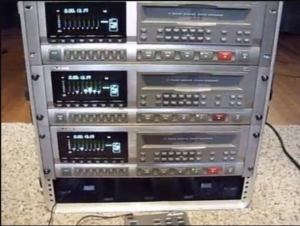
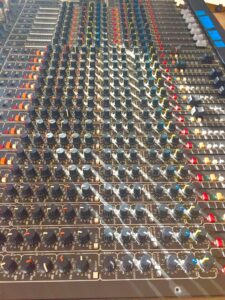
Just A City
RS: Where do you find inspiration for your own lyrics?
LP: Phrases, word play, things I say, things others say, magazines, books, life, anything, and everything can be in a lyric. The trick is to not trash your first ideas. You’ve got to let them simmer and grow. It’s too easy to let the critic downplay or step all over a new idea telling you it’s too simple or trite or stupid. But it’s the wrong time for the critic. It’s not editing time. During the first ideas is gathering time. Possibility time. Play time. Allowing time. Seeing what can happen time. Experiment time.
Wait
RS: Nice arrangement for the vocals on this tune. The influence of the Beatles is unmistakable. Do you consciously decide to write tunes that are influenced by certain bands or artists or does it just happen in a more subconscious manner on its own?
LP: Both, really. When a song suggests a direction stylistically of an artist/player I love, I go a bit further in that direction because it could be new territory for me. Like wanting Blue Mojo to sound as cool as Larry Carlton.
Wait, actually was written while making a cup of tea on a break from watching the movie, Nowhere Boy, about John Lennon. It was emotional for me to see him reenacted having so many missed opportunities to connect with his Mum, when they both so much loved and adored each other and wanted more from each other. It’s often obvious to the outsider what needs to be said or done to smooth out a wrinkle between people. But as they tore away from each other too proud to give in and just say what they wanted and meant, I had to stop the film and while waiting for the tea I picked up an acoustic and the chorus just came to me. It wasn’t lost on me that I was actually writing about my own Mum and life, but it was easier to write, inspired by, and thinking about John and Julia.
For Another Star
RS: The guitar work in this tune is especially nice. Can you briefly describe the process of how you go about recording the multiple guitar parts, where do you start and how do you know when you’re finished?
LP: For Another Star is the exact arrangement I recorded on my 4 tk. when I wrote the song before leaving for college to go to Berklee in 1978. I just played on the record what I played then. There’s a rhythm guitar part, then a tapping the chords rhythm part, and the harmonized lead. I always loved when The Allman Brothers, and Doobie Brothers would have harmonized lead guitars.
I play along to the track and see if I can come up with other parts. If my fingers aren’t reaching for anything too interesting, I stop playing and just listen to the song and ask myself what should be here? Another guitar? Horns? Organ? What’s the line, harmony, counterpoint what belongs here? I usually hum or sing something and go for that. What sound would fit, chorus, flange, distortion, overdrive, delay? Who has this sound? I play what comes to mind and it’s easier to be inspired to play the right part when I have the right sound. I often cue up the sound first which reminds me of a player and then I will conjure them, their idea, and come up with something cool. It’s like acting, or an alter ego, let me be Jeff Beck on this one, ah this one needs George Harrison, oh this one is a James Taylor flavor, or George Benson, or Pat Metheny, etc. I like having colors and options and depth of contrasting things I can play. My songs and arrangements are mixtures of all my favorite music and sounds. When it makes me smile and feels complete, I know it’s done. Sometimes I just have to let it sit for awhile and listen back days or weeks later to take inventory with a fresh perspective.
RS: You recorded Night Vision on 2″ tape. Did you stay strictly analog for the entire project or did you move the basic tracks to a digital platform to edit etc. or exactly how did you do all that? How did you find recording that way as compared to digital?
LP: Most of the recording for this album was done in Logic and mixed and mastered by me in Logic & Presonus’, DAW, Studio One.
I was the recipient of Berklee’s Faculty Recording Grant and got to record the basics of, Used to Love, and Guest List, live with friends in, Studio Two, The Arc, at Berklee, with the recording engineer, Leanne Ungar. But we didn’t record to tape. Leanne recorded those tracks in Pro Tools and then sent me the basics to overdub and mix in Logic.
Only the last song, For Another Star, had the basics of drums, rhythm guitar, lead vocals, and upright bass recorded to 2 inch tape. I had wanted to do a song or two completely analog to 2 inch tape but then came the pandemic. So, Michael Harmon (a Berklee grad) studio owner of Wachusett Recording sent me our basic tracks to, For Another Star, to finish and mix in logic.
When I switched from ADATS to Logic in 2005 there wasn’t a hybrid way of using analog gear with the computer. So, I sold my five foot long, 32 channel, recording, and mixing console and I missed it terribly. Over the years I felt that the fun of recording, playing with all the buttons, and knobs, and switches, was missing by being in the box.
When the computer gave me hassles because I was operating at 300% CPU I started to think I should just get a console again, and this time with a 24tk, 2 inch tape machine, wouldn’t that be fun! Then I met Michael Harmon and he said we can record to 2 inch tape at his studio. Working there with him I saw how much faster I had gotten working in Logic over the years. And because I so often track and play everything myself it didn’t make too much sense to keep wearing out the tape with all those overdubs I’d be making. Plus digital editing is superb and instant recall of mixes is fabulous. In my big console days a mix had to stay up on the console for weeks or months, I really couldn’t work on much else. But now you can save the session and open any other song and continue working.
Many engineers including Berklee alum, Fab Dupont, have said working with analog tape is, “a whole lot of subtle”. I have to agree. I don’t hear a sonic difference in, For Another Star, versus the other songs on this album. For me to go back to tape would be for the fun factor because I never owned a 2 inch tape machine before. Plus more buttons and more outboard gear is great fun. I have a very hybrid setup now, but no console or tape machine. I still get charmed by the idea but it would be like having a washing machine in the room, a big noisy thing to have to work around. I record and mix and master in the same open space because I am the player and the engineer. I don’t want to tuck the tape machine in a closet somewhere. Looking at it would be half the fun of having one.
MA: I would like you to talk about recording with different musicians and also different engineers. I think it would be an interesting topic to learn from. Also talking about the relationship that connects all the people with you and also how everyone gets to know each other better in the recordings, and how it adds positively to the song. – Max Abraham
LP: It’s fun to hear other people’s ideas if they are people you like and you admire their playing. I am usually the engineer so guest engineers was still novel for me but fun because I’m watching and learning too.
It’s too easy to sit back and wish someone would ask you to be part of their project or tour or co-write and then get sad because nothing happens. We’re all often too shy. When I realized that because I had lots of songs they were “reasons for invites and vehicles for collaboration” I put out feelers and requests to play with various friends and new acquaintances. There were guests even on my first album with my band, Two Tru, when we made our album, Among The Ruins. It was to include friends and have fun.
I have never liked or enjoyed competition in music so for me it’s about creating a space for my friends that feels like: I love you, I love what you do, let’s see if we can find something that fits the song. Let’s have fun and eat food together, and make music. I’m Italian so it’s always about the food. The friendships deepen as we all have more interactions together.
DJ: Do you have a set schedule for your creative efforts ( I.E. instrument lessons/practice, lyric writing, music writing, collaboration, etc, or do wait for the notions to strike you at random? – Daniel Jackson
LP: I had myself on a writing schedule for a number of years where a wrote a song a month, then it was two songs a month. What I learned was creativity is a muscle and I could use it, tune into it, anytime I want to. I love bolt of lightning inspirations but I also like exploring and playing with sounds, words, and instruments, and looking for the gems too. I’ve had all kinds of practice schedules over the years. Most recently it was practicing drums 2 hours a day. I get ‘round to all of it and each focus goes in spurts: I’m playing with words, I’m writing a lyric, playing piano, I’m tracking a song, mixing a song, finding a drum part, playing with a bass, singing vocal harmonies, or adding percussion. I do like keeping up the collaboration so it feels like something is happening. I like to be in the flow of music making so I will keep invitations out there with friends that I’m expecting tracks from. It’s play so there is a lot of randomness, and follow the inspiration wherever it leads. Somedays it feels like a lot and I can’t keep up, and somedays it’s just perfect and interesting. Either way I get to do this and I love it.
BM: Favorite guitar and why – Bernadette Mac
LP: A fender Stratocaster because it’s a great shape and size and feels great to hold.
SP: What comes first , as a rule, the lyrics or the music? – Stan Pulnik
LP: All different ways, no rules. Sometimes it’s a guitar idea, sometimes I’m whistling a melody. Sometimes it’s a drum groove, sometimes it’s a phrase, sometimes it’s a chord that starts the whole thing rolling.
GMV: I wanna know — if you were to be stranded on a desert island with only one of your guitars, which one would it be? And why? – Gina M. Vanderloop
LP: A fender Stratocaster because it’s a great shape and size and feels great to hold.
CR: My question is about the creative process. One thing I often struggle with is turning ideas into finished songs. I have so many ideas that I think have a lot of potential, and I often get stuck not developing them so they get lost. I believe a lot of musicians can relate to this. You’re one of the most creative people I know. You’ve proved it not only by continuously coming out with quality albums, but also in a lot of other everyday life things. How do you tackle the process of turning a simple idea into a finished song? Are there any specific steps you take? Does recording come into play once everything is set or is it something that you do as you go that helps you write? – Best, Claudio Raino
LP: You just have to practice finishing a song. It’s very possible that some of the ideas you have will sit nicely together and be the A or B section or bridge. I always make it a point to record or video myself singing or playing guitar ideas so there is something to go back and hear with all the energy and tempo and sound that inspired it built in. Sometimes it makes sense for me to notate something but I get more information from the recording or video.
Most of the time it’s giving yourself permission and seeing yourself as a composer. You probably didn’t think of yourself as an in-demand theater musician until you played your first tour and now you’ve been all around the world so you don’t have to think of yourself as that, you have lived it, you are that theater guitar player. But there was a before.
Sometimes I finish the song before I start recording. I usually put down the guitar part I wrote the song with, then sing or play the melody, then drums then bass, etc. Just recently I started with drums and recorded a beat I wanted for 4 min, then I played guitar to the drumming until I found a progression I wanted to use. Next I will come up with a melody as I play with words to write the lyric.
When I was a kid all my “just written”, finished songs were recorded on dinky cassette decks. There are still so many songs I haven’t released yet. I often go back to these tapes, relearn the song, and record them for real, and release them. These days though if you take your time and make sure you’re in tune, and in time, even a demo can be turned into the finished record. So I love that as a tool to help with writing. Digital editing is a godsend.
